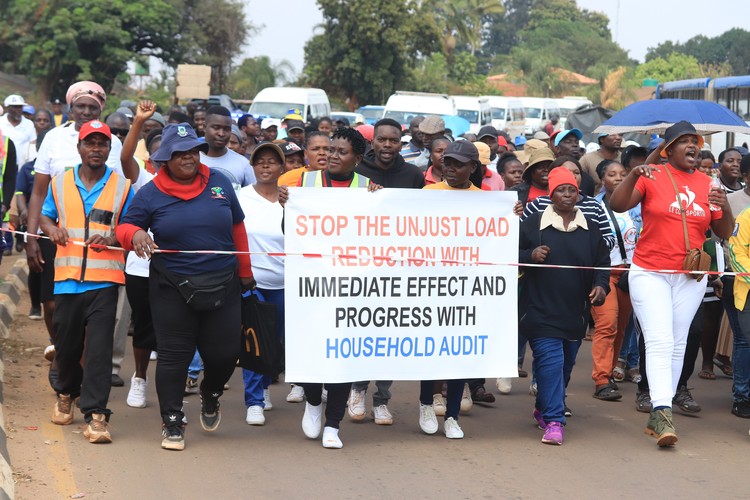
17 September 2024
People from four villages in Tshakhuma marched to Eskom’s offices in Thohoyandou, Limpopo to demand that the power utility end load reduction and remove illegal connections. Photos: Thembi Siaga
More than 200 people from four villages marched to the Eskom offices in Thohoyandou, Limpopo, on Tuesday 17 September, demanding an end to load reduction.
They walked two kilometres from the Thohoyandou Sports Ground. They want Eskom to tackle illegal connections in their communities.
Protesters from Tshakhuma were joined by residents from other affected villages, including Tsianda, Hamutsha, and Nesengani. Among their demands was that Eskom urgently go door to door and remove all illegal connections. Marchers complained that people on medication which requires refrigeration are affected, resulting in financial burdens and health hazards.
Marchers carried signs and sang, “There’s no more time to beg each other; we are tired of living in darkness. Give us the same power and equal rights”. Some residents complained that power outages had become worse since July and could last up to four hours.
They said TVET college students and school learners struggled to do their work at night during load reduction.
Community organisations such as the Luvuvhu Energy Forum and SA National Civics Organisation (SANCO) said they had held meetings with Eskom officials and sent letters, but to no avail.
“We are suffering, including school leaders and students. We blame load reduction for the rise in crime,” resident Makondelele Singo told GroundUp.
A memorandum of grievances was handed to Eskom manager Ntshavheni Nenguda. He promised to respond by 27 September.
In response to GroundUp on 19 September, Eskom said that load reduction was necessary due to the electricity network constantly overloading. This caused extensive damage to infrastructure and posed safety risks.
When asked about the evidence supporting the claim that 65% of households used illegal connections, Eskom cited instances of explosions that occurred as a result of these connections. The power utility blamed high losses, before implementing load reduction, on illegal connections and meter tampering.
According to Eskom, to mitigate load reduction, they have launched the “Save Your Transformers, Save Lives” campaign, urging customers to reduce consumption and ensure legal connections.
Eskom urged people to report illegal activities to authorities or on the Eskom Crime Line at 0800 112 722.
A memorandum of grievances was handed to Eskom manager Ntshavheni Nenguda who promised to respond by 27 September.